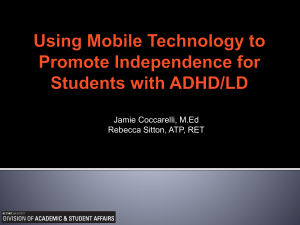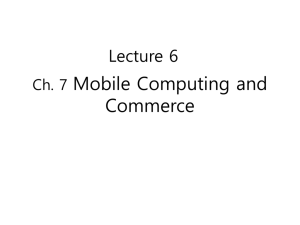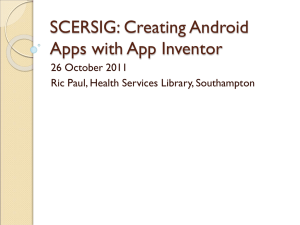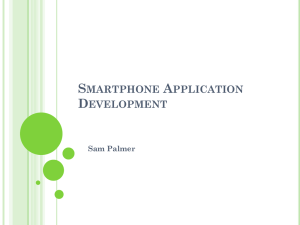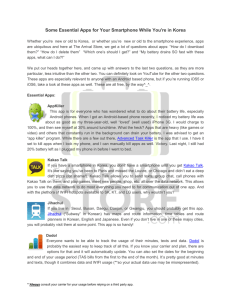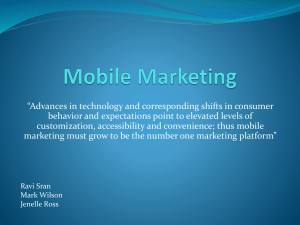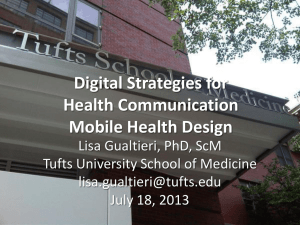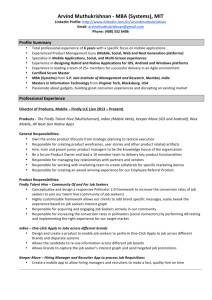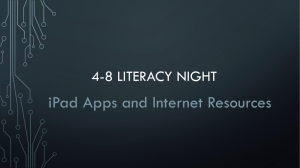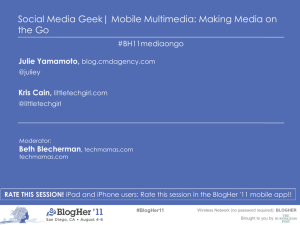PowerPoint - The Universities at Shady Grove
advertisement
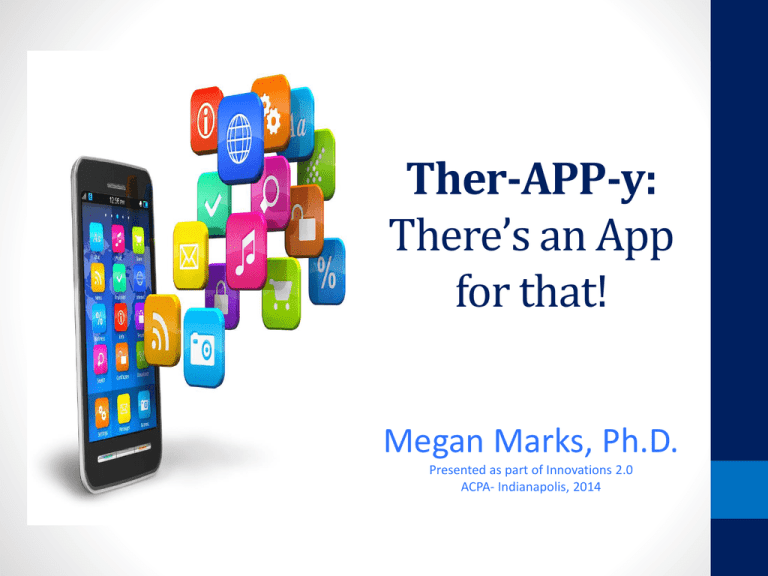
Ther-APP-y: There’s an App for that! Megan Marks, Ph.D. Presented as part of Innovations 2.0 ACPA- Indianapolis, 2014 mHealth Research • Mobilyze app for Depression • Emotional awareness/CBT case studies • DBT coach for Borderline Personality Disorder & Substance Dependence • Mood charting with adolescents • iHeal app for substance user Bulimia mHealth Research • Research indicates that apps hold promise for delivering psychotherapy in a non-stigmatizing fashion • Benefits: • Combat stigma of help seeking • Promotes self-sufficiency, empowerment • Increases access to care, reduces barriers • Promotes treatment compliance • Enhances interaction, engagement , retention • Meets students where they are Ther-APP-y Functions: • • • • • • • Clinical assessment Symptom monitoring Psycho-education Resource location Tracking treatment progress Skills training Recording Categories: • Depression/Mood/Suicide prevention • Substance use • Diet/Nutrition/Weight loss • Exercise • Productivity/Cognitive performance • Relationships • Relaxation/Sleep/Meditation Ther-APP-y In Session • Relaxation & Bio feedback • Breathe2Relax, BellyBio, GPS for the Soul, Mindshift • Mood and Symptom Tracker • T2 Mood Tracker, Optimism, Moody Me, eMoods bipolar tracker • Medication Compliance • PillBox, RxmindMe • Gratitude • Gratitude Tree, Gratitude 365, Gratitude Journal • CBT and ACT • eCBT Calm, OCD, iPromptU • ACT coach, ACT companion • Trauma • PE Coach, PTSD coach T2 Mobile Apps http://www.t2.health.mil/products/mobile-apps Outreach APP-lications • Apps on Center Website • http://www.uky.edu/StudentAff airs/Counseling/apps.html • Social Media • • “Mobile App Monday” App quick guides • Specific populations, & Presenting problems • Evaluation • Evaluate me, Polleverywhere, eClicker Outreach APP-lications: Suicide Prevention • General resources: • • • • Life Armor (iOS, Android) Hope Box (iOS, Android) Positivity Jackpot (Android) LifeBuoy (iOS) • Veteran specific resources: • Operation Reach out • Guard your Buddy • QPR: • Suicide Crisis Support (Android) • Suicide: The Forever Decision (iOS) • Local/State specific resources: • Psychological First Aid: • ASK & Prevent Suicide, Texas • PFA Campus Wide Apps • Stressbusters • Just in Case • Lifeline response References • Boyer, E.W., Fletcher, R., Ray, R.J., Smelson, D., Ziedonis, D. & Picard, R.W. (2012). Preliminary efforts directed toward the detection of craving illicit substances: The iHeal project. Journal of Medical Toxicology, 8 (1), 5-9. • Burns, M.N. et al., (2011). Harnessing context sensing to develop a mobile intervention for depression. Journal of Medical Internet Research, 13 (3), e55. • Dennison, L.D., Morrison, L., Conway, G., & Yardley, L. (2013). Opportunities and challenges for smartphone applications in supporting health behavior change: Qualitative study. Journal of Medical Internet Research, 15 (4), e86. • Donker, T. et al., (2013). Smartphone for smarter delivery of mental health programs: A Systematic review. Journal of Medical Internet Research, 15 (11), e247. • Gowen, L.K. (2013). Online mental health information seeking in young adults with mental health challenges. Journal of Technology in Human Services, 31, 97-111. • Kazdin, A.E. and Blasé, S.L. (2011). Rebooting psychotherapy research and practice to reduce the burden of mental illness. Perspectives on Psychological Science, 6, 2137. Questions? Megan Marks, Ph.D. University of Kentucky Email: Megan.Marks@uky.edu Twitter: meganmmarks References • Kraetz, C. & Cox, C. (2012). Smartphone technology and apps: Rapidly changing health promotion. International Electric Journal of Health Education, 15, 72-82. • Kuhn, E. et al. (2014). Clinician perceptions of using a smartphone app with prolonged exposure therapy. Administration Policy Mental Health, online • Luxton, D.D., McCann, R.A., Bush, N.E., Mishkind, M.C., and Reger, G.M (2011). mHealth for Mental Health: Integrating smartphone technology in Behavioral Healthcare. Professional Psychology: Research and Practice , 42, 6, 505-512. • Matthews,M., Doherty, G., Sharry, J., and Fitzpatrick, C. (2008). Mobile phone mood charting for adolescents. British Journal of Guidance and Counselling, 36 (2), 113-129. • Morris, M.E., Kathawala, Q., Leen, T.K., Gorenstein, E.E., Guilak, F., Labhard, M., Deleeuw (2010). Mobile therapy: Case study evaluations of a cell phone application for emotional self-awareness. Journal of Medical Internet Research, 12. • Rizvi, S., Dimeff, L.A., Skutch, J., Carroll, D., Linehand, M.M. (2011). A pilot study of the DBT: An interactive mobile ohone application for individuals with borderline personality disorder and substance use disorder. Behavior Therapy, 42, 589-600. References Websites • http://t2health.org/programs-telehealth.html • http://mobithinking.com/mobile-marketing-tools/latest-mobilestats/e • http://www.pewinternet.org/fact-sheets/mobile-technology-factsheet • http://telehealth.org • http://www.telementalhealthcomparisons.com/apps/therapyself-help-apps • Journals • Journal of Technology in Human Services • Journal of Medical Internet Research • Psychological Services

